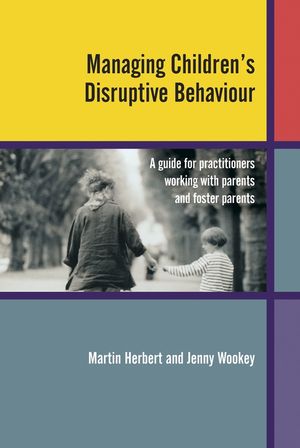Managing Children's Disruptive Behaviour: A Guide for Practitioners Working with Parents and Foster ParentsISBN: 978-0-470-84945-3
Paperback
208 pages
March 2004
 |
||||||
Preface.
Acknowledgements.
PART I: DISRUPTION BY THE CHILD.
Introduction.
1. Disruption in the home: Children in control – children out of control.
Definitions.
Consequences of the conduct disorders.
Risks and protective processes: the early history.
Developmental pathways and transmission of conduct disorders.
Restoring the balance.
Select bibliography.
2. Disruption in the foster home.
Fostering.
The break-up of children’s families.
The breakdown of fostering placements.
Interventions.
The concept of attachment.
Conclusion.
Select bibliography.
3. Disruption in the classroom.
Introduction.
The influence of school life.
The consultation (triadic) model.
Classroom management.
Disruptive behaviour.
Select bibliography.
PART II: FROM THEORY TO PRACTICE: PRINCIPLES OF ASSESSMENT AND TRAINING.
4. Behavioural parent training.
Introduction.
Behavioural theory.
Assessment methods.
Behavioural methods.
Select bibliography.
5. Orientation to the Child-Wise behaviour management programme.
Preliminaries.
Getting started.
Resistance.
Possible remedies to overcome resistance.
Notes on the courses.
Select bibliography.
PART III: COURSES.
6. The Child-Wise behaviour management course.
Objectives.
Course outline.
Session 1: Introduction to the course.
Session 2: Children’s needs.
Session 3: Play as ‘special’ (quality) time.
Session 4: Effective praise.
Session 5: Tangible and social rewards.
Session 6: ‘It’s as simple as ABC!’.
Session 7: Discipline.
Session 8: Ignoring and time-out.
Session 9: Removing rewards and privileges.
Session 10: Caring for yourself.
Session 11: Booster session.
7. The individual behaviour management course.
Objectives.
The Child-Wise home-based version.
Advantages of the home-based individual approach.
Reference.
8. Using the Child-Wise course with special needs children.
Introduction.
Guidelines.
Functional analysis.
Interventions – modifying antecedents.
Select bibliography.
9. The foster parents’ behaviour management course.
Introduction.
Session 1: Introduction.
Session 2: Behavioural change.
Session 3: The modification of behaviour.
Session 4: Rehearsing behavioural strategies.
Session 5: Booster session.
Appendix I: Issues for discussion and reminder handouts.
Appendix II: Course evaluation forms.
Appendix III: Child-Wise selection interview.
Appendix IV: Background to the Child-Wise course.
Index.



